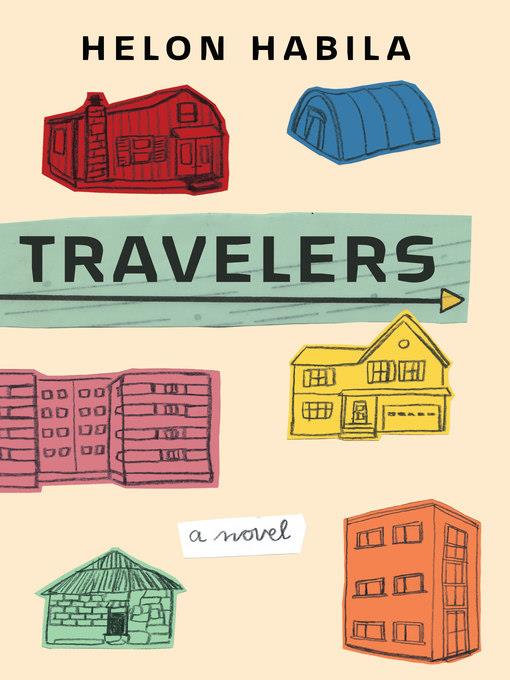
Travelers
A Novel
کتاب های مرتبط
- اطلاعات
- نقد و بررسی
- دیدگاه کاربران
نقد و بررسی

Commonwealth and Caine honoree and recipient of the Windham Campbell Prize (big kudos there), Habila here explores the lives of those compelled to leave their home country. A Nigerian scholar, in Berlin with his wife on her arts fellowship, cannot separate himself from the pain of other Africans he meets.
Copyright 1 Library Journal, LLC Used with permission.
April 29, 2019
The plight of contemporary African refugees is the dramatic core of this moving tale. The nameless narrator of the book’s opening (the novel is divided into six sections with different characters, but the narrator connects all of them) is a native Nigerian finishing work on his dissertation, who accompanies his American wife on her art fellowship to Berlin. While she paints, he falls in with a community of students who hail from Malawi, Senegal, and other African nations. Through the characters’ friendships and associations, Habila (The Chibok Girls) relates the stories of a number of asylum seekers who fled wretched circumstances and now face uncertain prospects (among them a former doctor working in Berlin as a nightclub bouncer and a man who escaped with his family from an armed Somalian rebel who was determined to marry the man’s 10-year-old daughter). The narrator comes to know the depths of their desperation himself when, returning from Switzerland, he loses his papers and is deported to a refugee camp in Italy. “Where am I? Who am I? How did I get here?” cries one refugee, summing up the sense of dislocation and loss of identity they all feel, yet Habila never presents them as objects of pity, but rather as exemplars of human resilience. Readers will find this novel a potent tale for these times.

May 15, 2019
A sweeping novel that gives voice to members of the African diaspora dispersed across contemporary Europe. The narrator is a Nigerian expatriate living in the United States with his American wife, Gina, a portrait artist. Their marriage is strained, but when Gina wins a fellowship in Berlin, the narrator joins her in a last-ditch effort to save the marriage. He soon feels himself a stranger amid Europeans, and his damaged marriage is little comfort: While Gina--whose race is never made explicit--had once been sensitive to the narrator's experiences as a black African immigrant, she is now "more oblivious of what was happening around her, her gaze focused only on her painting." Lonely in Europe, the narrator befriends Mark, a transgender Malawian film student who has escaped to Berlin to pursue his art. Mark favors impassioned proclamations about art and life--"What is the point of art if it is not to resist?" he asks naively--but his reverie is disrupted when he's detained for being in the country on an expired visa. Rattled by this exposure to the ugly side of migration, the narrator leaves Gina so he can travel around Europe, bringing him into contact with other African migrants. In one chapter, we're introduced to Manu, a Libyan of Nigerian extraction who flees his nation for Berlin, where he and his daughter await his wife's arrival. We also encounter Portia, the daughter of a Zambian writer, who's chasing the ghosts of her father and brother in Switzerland and England. Habila (The Chibok Girls, 2017, etc.) weaves the narrator's story through these others, providing readers a guide to the African diaspora. Even among all this movement, the book often feels static, a result of flat characters who, despite their harrowing stories, often seem more like types than people. Habila's prose is beautifully restrained but occasionally so mannered that it feels inert. When the narrator's marriage ends, it simply slides into a silence "occasionally [broken] by birdcalls." The prose undermines a story that should feel more urgent than it does. A powerful novel about African migrants that suffers from flat characters and prose.
COPYRIGHT(2019) Kirkus Reviews, ALL RIGHTS RESERVED.

May 15, 2019
Reminiscent of Arthur Schnitzler's late-nineteenth-century play La Ronde (and the dozens of multigenre adaptations since), Habila's (Oil on Water, 2011) fourth novel is a round-the-world journey that links disparate, desperate strangers. An unnamed African-history scholar (his PhD pending) and his American wife, Gina, relocate from Arlington, Virginia, to Berlin when the latter wins a prestigious fellowship; she's creating a portrait series called Travelers featuring real migrants, which provides the scholar's catalytic connection to global wanderers. The scholar, originally from Nigeria, and Gina part, and his peripatetic path leads him to a Malawian film student/activist; in Berlin, Basel, and London, to a Zambian woman searching for answers about her murdered brother and late father; in train transit, to a Somalian father on the run; on a Greek island, to a heartbroken doctor aching for news about his not-wife; and, in London, to a long-suffering Nigerian refugee in hiding. Habila deftly underscores unexpected connections, regardless of circumstances and geography?and, in so doing, offers a pressing reminder that human bonds will eclipse the strangling confines of borders and boundaries.(Reprinted with permission of Booklist, copyright 2019, American Library Association.)

























دیدگاه کاربران